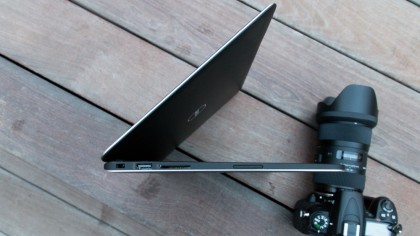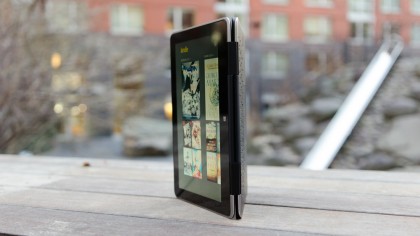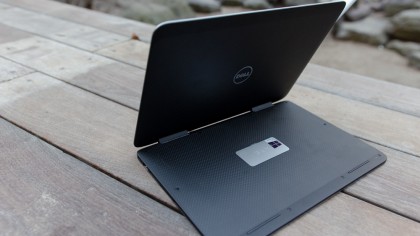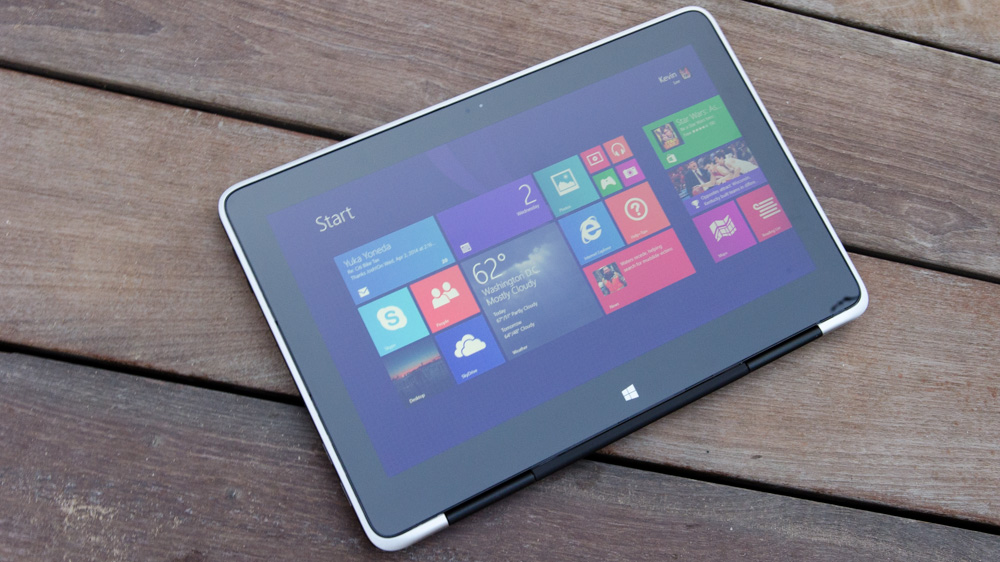Why you can trust TechRadar
The Dell XPS 11 is definitely a looker even when compared to the sleek Yoga 2 and the industrial design of the Surface Pro 2. Thanks to the Dell hybrid's carbon fiber construction, it's also the lightest of the bunch at just 2.5 pounds. All the extra plastic on the Yoga 2 ends up weighing it down to a hefty 2.9 pounds (1,315 grams). It's even a smidge lighter than the chunky, 2.55 pound (1,162 grams) Surface Pro 2 with its keyboard cover.
Even at its thickest point, the XPS 11 is also thinner and smaller than both devices - if only just slightly - at 11.8 x 7.9 x 0.4 - 0.6 inches, or 300 x 201 x 11 - 15 millimeters (W x D x H). The Yoga 2 is just a bit bigger overall, measuring 11.7 x 8.12 x 0.67 inches (298 x 206.5 x 17.2 millimeters).
The Surface Pro 2, however, beats out the Dell hybrid as the smallest device at 10.81 x 6.81 x 0.53 inches (274.5 x 173 x 13.5 millimeters). But anyone picking the XPS 11 or Microsoft's official tablet won't have any trouble slipping either device into a bag and carrying it around all day.

Spec sheet
This is the Dell XPS 11 configuration sent to TechRadar:
- CPU: 1.5 GHz Intel Core i5-4210Y (dual-core, 3M Cache, up to 1.9 GHz with Turbo Boost)
- Graphics: Intel HD Graphics 4200
- RAM: 4GB DDR3L at 1600Mhz
- Screen: 11.6 inch, 2560 x 1440 resolution WQHD screen
- Storage: 256GB SSD
- Ports: 2 USB 3.0 ports, HDMI, MicroSD reader, headphone/mic jack, and security lock slot
- Connectivity: 802.11ac Wi-Fi (Intel Dual Band Wireless-AC 7260), Bluetooth 4.0, NFC
- Camera: 1 megapixel webcam (720p HD video) and dual array digital microphones
- Weight: 2.5 pounds
- Size: 11.8 x 7.9 x 0.4 - 0.6 inches
This the highest-specification setup for the Dell XPS 11 that rings up to a grand total of $1,499 (£899), complete with the most SSD storage and fastest CPU available. The matching Australian configuration, meanwhile, is slightly more expensive at AU$2,498, thanks to a speedier 2.3GHz Intel Core i5-4300Y processor.
The XPS 11 starts at a fairer $999 (£799/AU$1,498), with the QHD display included. Every model also gets the future-proofing 802.11ac wireless and NFC connectivity features. However, the base configuration packs a tiny 80GB solid-state drive and an 1.5GHz Intel Core i3-4020Y processor.

The XPS 11 far outclasses the 11-inch Yoga 2 in terms of sharpness, which sports a standard 1366 x 768 IPS display. The 1920 x 1080 panel on the Surface Pro 2 also loses this race but it's still a respectable FHD resolution. Similarly, Dell's hybrid comes with one of the latest Core i5 Haswell chips, but these premium components also make the XPS 11 extremely pricey compared to its constituents.
For $699 (about £420/AU$754), users can get the maxed out Yoga 2 with a 2.16GHz Pentium N3520 (quad-core) processor. The Lenovo also has almost double the storage, with a standard 500GB hard disk drive. The XPS 11, however, still pulls away with a faster Core i5 chip and SSD that runs circles around that 5,400 rpm HDD.
The Surface Pro 2 is much closer in terms of competitive specifications. Packed with twice the RAM and a 256GB SSD, the Microsoft's slate rings up for $1,299 (£1,039/AU$1,469.00). However, the Surface Pro 2 comes with a slightly slower 1.3GHz Intel i5 (dual-core) CPU, but that should still be more than sufficient for tablet use and some light desktop applications.

With such a premium price, the XPS 11 runs into some significant competition outside of its 11.6 inch hybrid class. Users in the market for a lighter and cheaper dedicated laptop can pick up a dual-core, 1.7GHz Intel Core i7-powered 11-inch MacBook Air. Even with 8GB of RAM and the same 256GB SSD, this Macbook slides in under the XPS 11 asking price at $1,349 (£1,239/AU$1,649).
Kevin Lee was a former computing reporter at TechRadar. Kevin is now the SEO Updates Editor at IGN based in New York. He handles all of the best of tech buying guides while also dipping his hand in the entertainment and games evergreen content. Kevin has over eight years of experience in the tech and games publications with previous bylines at Polygon, PC World, and more. Outside of work, Kevin is major movie buff of cult and bad films. He also regularly plays flight & space sim and racing games. IRL he's a fan of archery, axe throwing, and board games.

